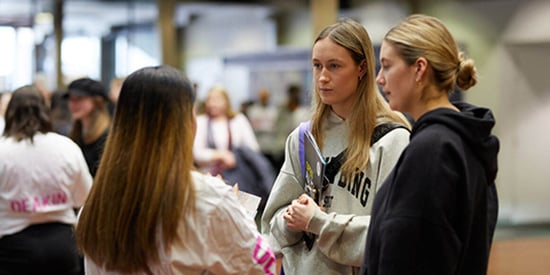Key facts
Locations
Current Deakin Students
To access your official course details for the year you started your degree, please visit the handbook
Course overview
The media and communications landscape is ever-changing, frequently in a state of flux. Future-proof your communications career – advance your current skill set, delve into contemporary research and develop the critical knowledge required to become a leader in this rapidly evolving industry.
Ready to become a highly sought-after, communications practitioner with thoroughly honed strategic and problem-solving skills?
With unprecedented advancement in technology and the increasing globalisation of business enterprises, strategic communication and critical thinking skills are a highly-valued, modern day commodity. Deakin’s Master of Communication will place you ahead of the game and empower you to thrive in roles that influence and shape opinion.
Tailor your degree to your career goals – specialise in advertising, journalism, public relations, digital media, sports media or visual communication design, with complementary electives. Enjoy a flexible, supported and stimulating learning environment, while collaborating with like-minded students, including those already working in industry. Learn from experienced staff and experts in the field, who ensure our course content stays up to date with the latest technological advances, industry demands and market conditions.
Explore theoretical concepts and frameworks and learn how to apply them in a practical setting. With internship and work-integrated learning (WIL) opportunities available, you can enhance your employment capabilities while expanding your professional networks.
As part of a professional capstone program, you will undertake a research project designed for an industry or scholarly audience under the guidance of academic supervision.
Whether you’re looking to upskill, change roles or challenge yourself in a new discipline, you will graduate as a holistic and reflexive communications practitioner well-prepared for the inevitable industry advances, challenges and opportunities yet to come.
Read MoreCourse information
- Award granted
- Master of Communication
- Year
2024 course information
- Deakin code
- A743
- CRICOS code?
- 084000E Burwood (Melbourne)
- Level
- Higher Degree Coursework (Masters and Doctorates)
- Australian Qualifications Framework (AQF) recognition
The award conferred upon completion is recognised in the Australian Qualifications Framework at Level 9
Course structure
To qualify for the award of Master of Communication, students must successfully complete 16 credit points of study comprising:
- Academic Integrity Module DAI001 Academic Integrity Module (0-credit-point compulsory unit) plus;
Core Communication Program (4 credit points)
Students must complete a common foundation program in contemporary professional communication focusing on key communication concepts and applied research methods, studying these two units in the first year of study:
- ACX701 Communication Concepts (2 credit points)
- ACX702 Applied Research Methods for Communication (2 credit points)
Specialisation (8 credit points)
Students must complete 8 credit points from one specialisation, to provide in-depth knowledge and professional expertise in a sub-field of communication, completing both of the following:
- four one-credit-point specialisation-specific units selected from one only of six specialisations (Advertising; Digital Media; Journalism; Public Relations; Sports Media; or Visual Communication Design); and
- a four-credit-point professional capstone program including a mandatory research project whose topic is relevant to that specialisation
Electives (4 credit points)
Students select 4 credit points of electives from any specialisation in the course to create a distinctive degree to advance their professional careers and/or extend their academic knowledge in related areas. Students may complete up to two electives from any equivalent postgraduate course at Deakin University including stackable short courses (0.5cp microcredentials), subject to eligibility.
Students seeking course-accredited PRIA membership for their degree must complete at least two credit points of electives using ALR-coded units, unless advised otherwise.
4
Core communication program credit points
8
Specialisation and capstone credit points
4
Elective credit points
16
Total credit points
Core units
Professional capstone program
Students will either take Option A or Option B noting that Option B requires approval of the Course Director; most students will normally complete Option A
Option A
- Developing a Communication Research Project
- Professional Research Project 1
- Professional Research Project 2
- Communication and Creative Arts Internship
Or an elective related to the research project where no appropriate internship is available
Option B
(Only by approval of Course Director, achievement of a Distinction or higher average in previous coursework including ACX703, and agreement of supervisor)
- Developing a Communication Research Project
- Academic Research Project 1
- Academic Research Project 2
- Academic Research Project 3
Stackable short courses
Mix and match Deakin short courses (0.5 cp microcredentials) to earn up to 2 credit point(s) of open electives, subject to eligibility. Any stacking must add up to a whole number to be used for credit. See more information on Deakin short courses options.
Specialisations
Refer to the details of each specialisation for availability.
Intakes by location
The availability of a course varies across locations and intakes. This means that a course offered in Trimester 1 may not be offered in the same location for Trimester 2 or 3. Check each intake for up-to-date information on when and where you can commence your studies.
Trimester 1 - March
- Start date: March
- Available at:
- Burwood (Melbourne)
- Online
Trimester 2 - July
- Start date: July
- Available at:
- Burwood (Melbourne)
- Online
Trimester 3 - November
- Start date: November
- Available at:
- Burwood (Melbourne)
- Online
Additional course information
Course duration
Course duration may be affected by delays in completing course requirements, such as accessing or completing work placements.
Mandatory student checks
Any unit which contains work integrated learning, a community placement or interaction with the community may require a police check, Working with Children Check or other check.
Participation requirements
Reasonable adjustments to participation and other course requirements will be made for students with a disability. More information available at Disability support services.
Work experience
Elective units may provide the opportunity for Work Integrated Learning experiences.
Entry requirements
Selection is based on a holistic consideration of your academic merit, work experience, likelihood of success, availability of places, participation requirements, regulatory requirements, and individual circumstances. You will need to meet the minimum academic and English language proficiency requirements to be considered for selection, but this does not guarantee admission.
Academic requirements
To be considered for admission to this degree you will need to meet the following criteria:
- completion of a bachelor degree or higher in any discipline
English language proficiency requirements
To meet the English language proficiency requirements of this course, you will need to demonstrate at least one of the following:
- bachelor degree from a recognised English-speaking country
- IELTS overall score of 6.5 (with no band score less than 6.0) or equivalent
- other evidence of English language proficiency (learn more about other ways to satisfy the requirements)
Admissions information
Learn more about Deakin courses and how we compare to other universities when it comes to the quality of our teaching and learning.
Not sure if you can get into Deakin postgraduate study? Postgraduate study doesn’t have to be a balancing act; we provide flexible course entry and exit options based on your desired career outcomes and the time you are able to commit to your study.
Recognition of prior learning
If you have completed previous studies which you believe may reduce the number of units you have to complete at Deakin, indicate in the appropriate section on your application that you wish to be considered for credit transfer. You will need to provide a certified copy of your previous course details so your credit can be determined. If you are eligible, your offer letter will then contain information about your credit transfer. Your credit transfer is formally approved prior to your enrolment at Deakin during the Enrolment and Orientation Program. You must bring original documents relating to your previous study so that this approval can occur.
You can also refer to the Recognition of prior learning system which outlines the credit that may be granted towards a Deakin University degree.
Fees and scholarships
Fee information
Learn more about fees and your options for paying.
The 'Estimated tuition fee' is provided as a guide only based on a typical enrolment of students completing the first year of this course. The cost will vary depending on the units you choose, your study load, the length of your course and any approved Recognition of prior learning.
One year full-time study load is typically represented by eight credit points of study. Each unit you enrol in has a credit point value. The 'Estimated tuition fee' is calculated by adding together eight credit points of a typical combination of units for your course.
You can find the credit point value of each unit under the Unit Description by searching for the unit in the Handbook.
Learn more about tuition fees.
Scholarship options
A Deakin scholarship might change your life. If you've got something special to offer Deakin – or you just need the financial help to get you here – we may have a scholarship opportunity for you.
Postgraduate bursary
If you’re a Deakin alumnus commencing a postgraduate award course, you may be eligible to receive a 10% reduction per unit on your enrolment fees.
Apply now
Applications can be made directly to the University through StudyLink Connect - Deakin University's International Student Application Service. For information on the application process and closing dates, see the How to apply web page.
Fill out the application form and submit to a Deakin International office or take your application form to a Deakin representative for assistance
For information on the application process and closing dates, see the How to apply webpage.
If you’re still having problems, please contact Deakin International for assistance.
Research Information
Students will undertake a capstone research design and preparation unit worth one-credit-point, resulting in the completion of a professional practice-focused project for an industry audience. An academic research project (scholarly thesis) option is also available. Students who undertake the academic research project may be eligible to apply for future PhD study.
Careers
Career outcomes
Now more than ever is a great time to be in the media and communications industry. From media agencies and newsrooms, to publications, community relations and government organisations, anywhere in the world – the career opportunities are vast.
Our Master of Communication prepares you for roles such as:
- advertising account manager
- brand communication copywriter
- communications consultant or researcher
- corporate affairs director
- investigative journalist
- media adviser or planner
- public relations specialist
- social media manager
- sports media producer, journalist or commentator
- visual designer.
For more information go to 'DeakinTALENT'
Professional recognition
Students specialising in public relations may qualify for accredited membership of the Public Relations Institute of Australia (PRIA) by completing 6 credit points of ALR-coded units in addition to their PR-related research project.
Course learning outcomes
Deakin's graduate learning outcomes describe the knowledge and capabilities graduates can demonstrate at the completion of their course. These outcomes mean that regardless of the Deakin course you undertake, you can rest assured your degree will teach you the skills and professional attributes that employers value. They'll set you up to learn and work effectively in the future.
| Deakin Graduate Learning Outcomes | Course Learning Outcomes |
| Discipline specific knowledge and capabilities | Apply expert knowledge of contemporary communication methods in one or more specialist areas including Journalism, Public Relations, Digital Media, Sports Media, and Visual Communication Design, and in scholarly contexts. |
| Communication | Use expert, specialised skills to communicate across a range of platforms and share knowledge and research findings with diverse audiences, in a way that has impact in professional and scholarly contexts. |
| Digital literacy | Utilize generic and specific digital technologies to address a range of communication needs in research and professional contexts and for diverse audiences within and outside the communication industries. |
| Critical thinking | Critically analyse and evaluate complex ideas in communication theory, develop appropriate methodologies for application in industry or academic research projects, and communicate conclusions in the context of professional decision-making and scholarship. |
| Problem solving | Analyse, evaluate, and critique complex information in order to identify problems and develop creative solutions in a range of professional practice and scholarly contexts. |
| Self-management | Employ high level autonomy, accountability and initiative in responding creatively to new situations in professional communication practice and/or in the completion of a substantial research-based project. |
| Teamwork | Work and learn collaboratively in professional communication practice and in scholarly contexts, including exercising initiative and accountability as a team member. |
| Global citizenship | Critically reflect on communication-related issues in both domestic and global contexts as a scholar and in professional practice, taking into consideration cultural and socio-economic diversity, social and environmental responsibility, and the application of the highest ethical standards. |
| Approved by Faculty Board May 2023 | |




